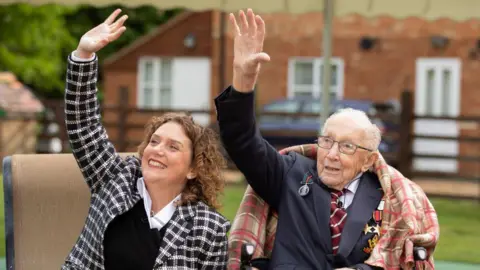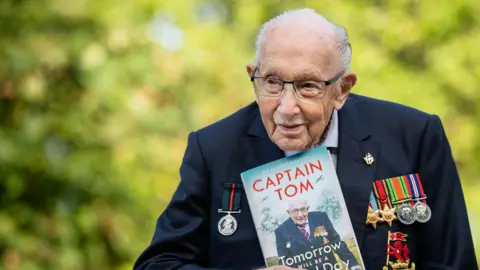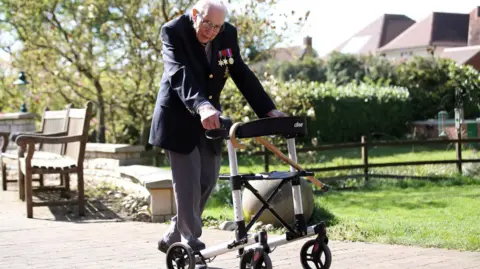Captain Tom probe 'did not dent trust in charities'
 Getty Images
Getty ImagesTrust in charities remains relatively high despite an inquiry that found "mismanagement" of the Captain Tom Foundation by members of his family, a watchdog has claimed.
Capt Sir Tom became a household name during the first Covid-19 lockdown, raising £38.9m for NHS charities at his home in Marston Moretaine, Bedfordshire.
A separate charity was created after he died - the Captain Tom Foundation - but a Charity Commission report found that trustee and daughter Hannah Ingram-Moore and her husband had misled the public.
The family previously said they would not appeal against the findings, but they "fundamentally disagree with the conclusions reached by the Charity Commission".
 Getty Images
Getty ImagesThe watchdog said despite strong public awareness of the investigation, annual research showed "overall trust in charities has not been impacted and has remained stable".
It added the Captain Tom charity inquiry was one of the main reasons why people said they were aware of the commission, and could have increased positivity towards the watchdog.
The millions raised by Sir Tom and donated to NHS Charities Together before the foundation was formed were not part of the commission's inquiry.
Rather, eyebrows were raised at the £1.47m book deal and an £18,000 awards ceremony appearance fee that were among the financial benefits Hannah and Colin Ingram-Moore enjoyed through their links to the Captain Tom Foundation.
Mrs Ingram-Moore maintained to the BBC that her father wanted the family to benefit from the book deal.
 Reuters
ReutersThe commission said its annual research showed people were more likely to trust a charity than banks, police and the ordinary person in the street.
High levels of trust in charities dipped slightly by 1% to 57% this year, while low levels of trust rose to 10% from 9% last year - although the commission said such small percentage changes were not statistically significant.
Almost two thirds of people (64%) of those surveyed said they believed most of the money raised by charities went to the end cause, up 7% on the previous year.
A commission spokesperson said: "Despite some high-profile examples of charity wrongdoing over the last year, these results suggest the public are well aware such instances are very rare.
"This points to the benefits all charities gain from effective, visible regulation, which gives the public confidence in supporting registered charities with their money and time."
However, the proportion of people donating to or fundraising for charity fell from 62% in 2020 to 48% in 2024, the commission said.
At the same time, the percentage of people receiving help from charitable organisations rose from 3% to 9% over that four-year period.
Follow Beds, Herts and Bucks news on BBC Sounds, Facebook, Instagram and X.
